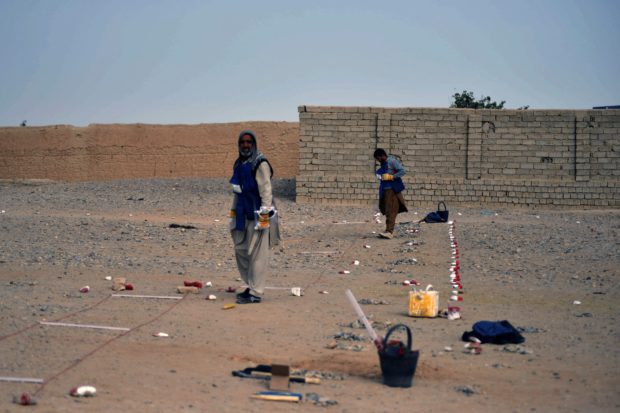Clearing Afghanistan’s landmines one careful step a time

This picture taken on November 9, 2021 shows deminers from the HALO (Hazardous Area Life-Support Organization) Trust working in Nad-e-Ali village in Helmand province. AFP
‘Screaming and crying’
HALO — one of the favourite charities of Princess Diana — struck an agreement with the new Taliban authorities in September to have its more than 2,500 Afghan employees return to work. In Nad-e-Ali, Taliban fighters are now guiding HALO’s deminers to find the deadly traps they set up. Because they live in the village and do not want to be blamed for civilian deaths, Taliban fighters “used to take them out with their own hands, but we stopped them to avoid any further detonations”, said Khan. But even as demining efforts persist, explosions have already caused casualties among villagers. Two months ago the wife of a village teacher lost both her legs when an explosive device detonated the moment she opened the door of her house. “This incident was very painful. I saw it happen with my own eyes,” said the teacher, Bismillah. “I saw my children screaming and crying… I’m alone and the stress is too much, too much.” Since then, the village and its school have been classified as a “high priority” demining zone.‘I am afraid’
It was HALO that set up the red and white rocks to mark out safe corridors for their 10 teams of eight deminers as they carefully inspect the ground using metal detectors. “When it detects metal, battery or anything it rings an alarm. Then we mark the area, and start to dig very carefully,” said supervisor Bahramudin Ahmadi. “As soon as we have a visual of the mine we inform the demining team and we inform the local security, as they have to give the permission to clear the zone and after that we detonate it.” Over the past three months, 102 explosive devices have been defused in the region, including 25 in the village itself — but that is believed to be just a fraction of what remains buried in the ground and hidden inside some houses. For HALO, it is a race against time in post-war Afghanistan to “decontaminate” one of the most heavily mined countries in the world. The priority is to protect children. In Nad-e-Ali, HALO workers were blunt about the dangers. “Please understand, if you lose a leg you know how much it will cost your parents, and if you die how much sorrow,” Nazifullah, a HALO programme manager, told a group of children sitting cross-legged on the ground. “What do you do if you see this?” he asks them, pointing at a picture of a landmine. “I will immediately tell my family, my brother or my imam at the mosque,” said eight-year-old Nazia. “I am afraid, but I know that when I see white rocks we can play and when it’s red we can’t play.”
READ NEXT
EDITORS' PICK